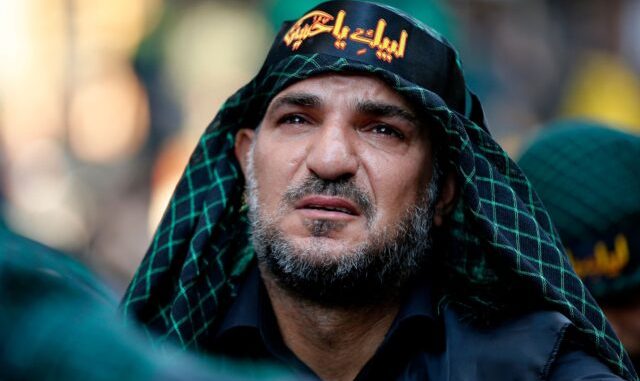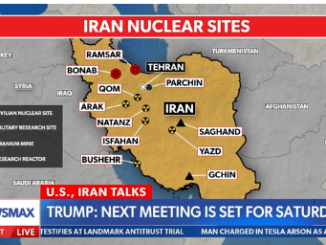
Igal Ekdesman, Deputy Head of Mission at the Israeli Embassy, explained during a local event that the Iranian proxy terror group is working “hand in hand” with organized crime and extended an offer to help draft legislation establishing a list of organizations that must be “fought.”
Published November 11, 2025
The Israeli embassy in Montevideo, Uruguay, has issued a warning that Hezbollah, the Lebanon-based Shiite militant and political group, is expanding its influence and operational networks in South America. According to statements by Igal Ekdesman, Deputy Head of Mission at the Israeli Embassy in Uruguay, Hezbollah is reportedly forming ties with organized crime groups across the region, raising concerns over illicit activities such as drug trafficking and money laundering.
“Organizations like Hezbollah are working hand in hand with criminal networks in South America,” Ekdesman stated during a briefing with Uruguayan officials. “This is a growing threat that must not be underestimated, and cooperation between states is essential to monitor and prevent these activities.”
According to Israeli assessments, Hezbollah’s presence in the region is multifaceted. Beyond ideological operations, the organization appears to be engaging with existing criminal networks to generate revenue. This includes participation in cocaine trafficking, money-laundering operations, and other illicit financial activities, which are believed to fund the group’s operations abroad.
The Israeli embassy emphasized that Uruguay and other South American nations should not assume that their territories are immune to such networks. Authorities have been encouraged to implement stronger measures and legal frameworks to identify and counteract groups that combine militant operations with criminal enterprises.
In response to the warnings, Israel offered assistance to Uruguay in drafting legislation aimed at defining and sanctioning organizations linked to terrorist activities and organized crime. Such measures would enable law enforcement to target financial and operational channels that groups like Hezbollah could exploit.
The region’s vulnerability to such networks is not entirely new. The Tri-Border Area, where Argentina, Brazil, and Paraguay meet, has long been identified as a hotspot for illicit activities and potential terror-financing networks. Previous reports have noted that the area provides opportunities for organized crime and militant groups to collaborate, using cross-border routes and minimal oversight to move money, drugs, and other illicit goods.
Hezbollah itself has a complex structure. Based in Lebanon, it functions both as a political party and an armed group, with significant backing from Iran. Over the years, it has diversified its operations to include financial networks outside the Middle East, allowing it to maintain and expand its influence globally. Latin America has been cited in intelligence and security reports as a region where Hezbollah-linked networks can operate under the radar, often through alliances with local criminal enterprises.
While Israel’s warning stresses a growing risk, Uruguayan authorities have reportedly not confirmed the scale or direct impact of these activities. Nevertheless, officials have been urged to remain vigilant, improve monitoring of organized crime activities, and enhance cooperation with international partners to ensure that these networks are effectively tracked.
This development marks a significant step in the ongoing monitoring of global militant networks and highlights the ways in which terrorist organizations may seek to integrate with local criminal systems to support their operations.
 Implications
Implications
-
Strengthening of Criminal Networks: Hezbollah’s reported collaboration with organized crime could enhance the operational capacity of both parties, allowing criminal networks to become more sophisticated, harder to dismantle, and capable of operating across borders with increased efficiency.
-
Regional Security Challenges: Countries in South America, particularly Uruguay and those near the Tri-Border Area (Argentina, Brazil, Paraguay), may face heightened risks of cross-border trafficking, smuggling, and illicit trade. The blending of militant objectives with criminal activity increases the complexity of law enforcement efforts in the region.
-
Terror Financing and Global Operations: By partnering with criminal enterprises, Hezbollah may secure funding streams to support its activities beyond the Middle East, potentially extending its reach into other regions. This financial diversification reduces the group’s reliance on state sponsors or donations and could sustain long-term operations.
-
Legal and Policy Pressure: Governments may need to strengthen or enact legislation targeting both terrorism and organized crime, focusing on financial monitoring, anti-money-laundering frameworks, and punitive measures for entities linked to these networks. It could also push countries to adopt stricter oversight of financial institutions and cross-border trade.
-
Increased International Cooperation: The warning highlights the necessity for collaborative efforts between South American nations, Israel, and global security partners. Intelligence sharing, joint investigations, and coordinated enforcement actions may be required to track and disrupt illicit networks effectively.
-
Challenges for Law Enforcement and Intelligence: Law enforcement agencies may face greater operational and investigative challenges as militant groups integrate into existing criminal structures. Surveillance, monitoring of financial flows, and human intelligence operations will need to be enhanced to identify connections between Hezbollah and organized crime.
-
Impact on Regional Stability: The potential fusion of militant and criminal networks could destabilize local economies and communities, as profits from illicit operations may fund corruption, violence, or coercion. It may also create indirect social and political pressures on governments attempting to maintain order.
-
Precedent for Other Regions: If Hezbollah successfully embeds itself in Latin America’s criminal landscape, it could serve as a model for similar strategies in other regions, allowing militant groups to leverage criminal networks worldwide for funding, logistics, and operational cover.
 Overall Takeaway:
Overall Takeaway:
Israel’s warning to Uruguay underscores the growing concern over Hezbollah’s activities in South America and its potential collaboration with organized crime. While Uruguayan authorities have not confirmed the full scale of these operations, the alert highlights the need for vigilance, legal frameworks, and international cooperation. Monitoring and countering these networks will be essential to prevent illicit activities from funding militant operations and to safeguard regional security.
SOURCES: BREITBART – Report: Israel Warns Uruguay Hezbollah Is Building Ties to Organized Crime in Region





Be the first to comment